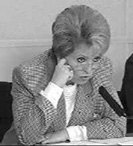Women and Power: The Unrequited LoveSome of the politicians believe that there can be no special women’s interests in politics; there exist the panhuman values that one should stand up for. There are quite a few women among such politicians. But our today’s guest adheres to an opposite point of view. Let us call upon Svetlana Aivazova, a historian, politologist, Doctor of Politology. Women coming to power in various countries of the world invariably have to prove that the "weaker sex" has its own special social interests at present. This argument was used in the Scandinavian countries, Canada, France. Before long the French National Assembly will discuss the bill considering the numeral equality of men and women in the candidate lists at all levels of representative body of the government. In this bill special measures are taken in order to keep this equality: from the refusal to register party lists in the course of the election campaign to amercements. This is the way the idea of parity democracy is affirmed – i.e. equal representation of men and women in the regulatory bodies. French women have been standing up for the idea of parity democracy since the beginning of the 90-s – approximately at the same time as Russians. After these years they have come to as far as discussing the finished bill. Unfortunately, we are not advancing in the same direction – worse, we are rolling back. - Of course, we can hardly keep level with the western countries that have been following another model of development for decades. But on the other side, Russian women have no other way but to gain their share of power, if they want to change their situation and become competent citizens of the country.
- Russian society is very special, it is a society of power. No social position can be taken here if you do not possess real levers of power, if you are not a part of the power structure. Here are some figures concerning the women’s position in the structures of the Federal executive power: there are 56% women at its lower levels but the authoritative functions (ministers, deputy ministers etc.) are taken by men: only 9% women among the persons "in charge". The legislative bodies vary greatly by the number of women in different regions of Russia. From zero representation in the legislative assemblies of Novosibirsk, Ryasan and Kursk Regions to 32% in Kurgan Region, Evenkiysky and Koryaksky Autonomous Regions. It is hard to comprehend the reasons.
There were 139 organizations that had the right to take part in the last elections to the Duma, including 6 purely women’s associations. These were the following movements: "Women for the Health of Nation", "Women’s Consolidated Union", "Women of Russia", the Movement of Women of Russia, the Russian Party of Social Protection of Women and the Movement of Mothers for Social Justice. 11 associations were headed by women. "Women of Russia" took part in the elections independently (their block was joined by the movement "Women for the Health of Nation"), as well as the Russian Party of Social Protection of Women. The Movement of Women of Russia entered into the political association "Fatherland – All Russia". Among the candidates who were to be elected from the party lists (225), the proportion of women was no less than 16% in any of the lists. Mind that there were 7% in 1993 and 14% in 1995. So the tendency to growing of the women’s proportion in the total number of candidates still exists. But as to the favorites of the election campaign – The Communist Party, "Fatherland – All Russia", "Apple" and "Bear" – the percent of women is lower than the average in the whole specter of claimants. In general there are 11% women among the candidates. The highest number of women – 17 percent – belong to the "Union of the Right Forces" list. The lowest proportion of women can bee seen in the lists of nationalist and so-called "patriotic" parties; for instance in the "Zhirinovsky Block" there are just 2.5% female candidates. What do these data tell us? Once again there won’t be more than 10 percent women in the Parliament. It means that the legislative power will keep its obviously male profile. Such legislative power is not able to take women’s interests into account. It is not a coincidence that the average salary in the so-called "women’s" branches has been about 40% of the average salary in the country over the last few years. While in the "men’s" industries such as oil companies the income reaches 360% of the average. It means that economic laws produced by the Russian Parliament are objectively supporting and deepening gender inequality. Isn’t this the obvious answer to the question: do women have any special social interests that they have to defend? These interests are connected with the real situation of women in the today’s Russian society. To sum it up, one can say that judging by gender representation our country is deeply patriarchal, unable for steady development and stability, inefficiently administrated and wasteful from the point of using both human and natural resources. - What are the prospects to your point of view? - Judging by the latest polls, there is a new generation of girls, today’s students, growing up. In contrast to the previous generation, they are serious about building their future career – be it professional or political. My hopes are with them, their potential and social activity.
The interview was conducted by Galina Snopova
|
